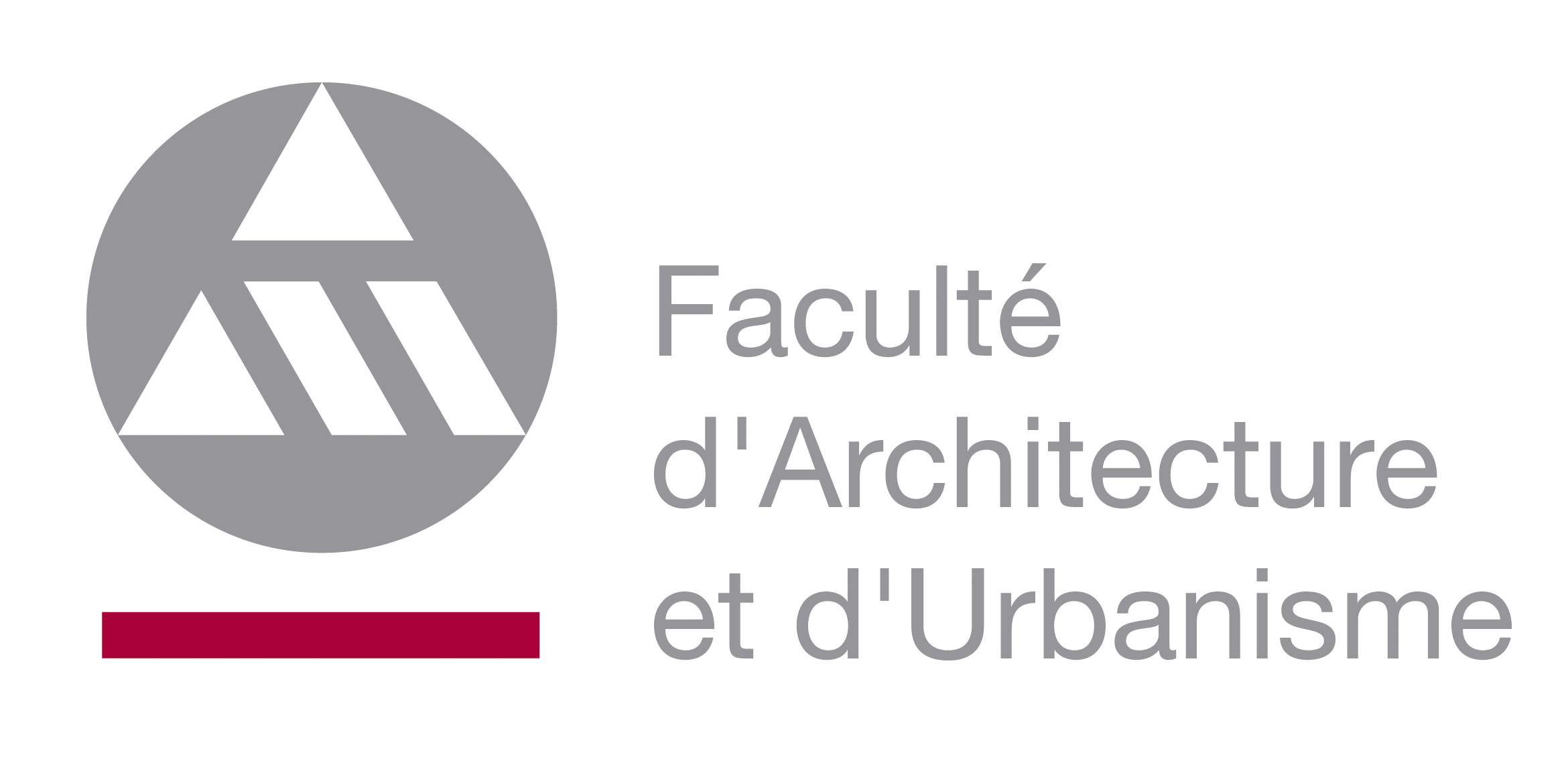 | Study programme 2019-2020 | Français | |
 | Theories of Architecture III | ||
Programme component of Bachelor's in Architecture à la Faculty of Architecture and Urban Planning |
| Students are asked to consult the ECTS course descriptions for each learning activity (AA) to know what assessment methods are planned for the end of Q3 |
|---|
| Code | Type | Head of UE | Department’s contact details | Teacher(s) |
|---|---|---|---|---|
| UA-B3-ARCHIT-002-M | Compulsory UE | POULEUR Jean-Alexandre | A530 - Service d'Architecture et Société |
|
| Language of instruction | Language of assessment | HT(*) | HTPE(*) | HTPS(*) | HR(*) | HD(*) | Credits | Weighting | Term |
|---|---|---|---|---|---|---|---|---|---|
| Français | 22 | 2 | 0 | 0 | 0 | 2 | 2.00 | 2nd term |
| AA Code | Teaching Activity (AA) | HT(*) | HTPE(*) | HTPS(*) | HR(*) | HD(*) | Term | Weighting |
|---|---|---|---|---|---|---|---|---|
| A-CARC-103 | Theories of Architecture III | 22 | 2 | 0 | 0 | 0 | Q2 | 100.00% |
| Programme component | ||
|---|---|---|
 | UA-B1-ARCHIT-002-M Theories of Architecture I | |
Objectives of Programme's Learning Outcomes
- Instruct an architectural issue
- Study the different components of a theme to articulate its findings in a comprehensive summary
- Build an architectural culture based on theoretical and critical knowledge and personal reading
- Coordinate the various disciplines related to architecture and urban planning transversely
- Contextualise their approach to architecture
- Plan and organise architecture projects adapted to a context
- Develop a spatial response
- Develop a project methodology integrating the various constraints related to the architectural discipline
- Implement an identified spatial response
- Adopt an applied scientific approach
- Interact with all actors
- Develop a professional attitude
- Provide, share and defend their ideas in collective discussion related to governance frameworks.
- Make choices
- Demonstrate reflexivity, openness and initiative
- Demonstrate ethical values
Learning Outcomes of UE
Theory of Architecture III: architectures and democracies II. Master the complexity of the processes that lead to architectural creativity in our society. Develop general knowledge and use it to understand what is at stake in an architectural production. Be able to identify concepts which have led to the production of architecture. Use concepts as tools of analysis to better understand architecture in its spatiality and temporality. In short, develop good architectural analytical skills and a synthetic view to initiate critical thinking.
Content of UE
See Learning Activity
Prior Experience
Mastery of the French langage (CESS level).
Theory of architecture I (bloc 1) : architectures and democracies 1.
Type of Assessment for UE in Q2
- Written examination
Q2 UE Assessment Comments
The evaluation consists of a standard examination on the matters treated during the course: a written test consisting of a MCQ (multiple-choice questionnaire), concepts to be explained and/or topics to be developed. It aims to determine the accuracy of your architectural analysis and synthesis capacities. Your participation on the Moodle forum could be considered a bonus for your evaluation.
Type of Assessment for UE in Q3
- Written examination
Q3 UE Assessment Comments
The evaluation consists of a standard examination on the matters treated during the course: a written test consisting of a MCQ (multiple-choice questionnaire), concepts to be explained and/or topics to be developed. It aims to determine the accuracy of your architectural analysis and synthesis capacities. Your participation on the Moodle forum could be considered a bonus for your evaluation.
Type of Teaching Activity/Activities
| AA | Type of Teaching Activity/Activities |
|---|---|
| A-CARC-103 |
|
Mode of delivery
| AA | Mode of delivery |
|---|---|
| A-CARC-103 |
|
Required Reading
| AA | |
|---|---|
| A-CARC-103 |
Required Learning Resources/Tools
| AA | Required Learning Resources/Tools |
|---|---|
| A-CARC-103 | Not applicable |
Recommended Reading
| AA | Recommended Reading |
|---|---|
| A-CARC-103 | Copie de présentation - Partie 1 - Théorie de l'archichitecture III : architectures et démocraties - JA Pouleur ,Copie de présentation - Partie 3 - Le rôle de l'architecte - Jean-Alexandre Pouleur ,Note de cours - Théorie de l'architecture III : Architectures et démocraties - Bernard Huet & Jean-Alexandre Pouleur ,Copie de présentation - Partie 2 - Théorie de l'architecture III : Architectures et sociétés - JA Pouleur |
Recommended Learning Resources/Tools
| AA | Recommended Learning Resources/Tools |
|---|---|
| A-CARC-103 | GROPIUS Walter, Architecture et société. Textes choisis, présentés et annotés. Traduit de l'allemand. Paris, Editions du Linteau, 1995, 199 pages. DE CARLO Giancarlo, Entretiens avec Franco Buncuga, Architecture et liberté, Les éditions du Linteau, 2004, 310 pages. RAGON Michel , L'Architecte, le prince et la démocratie : Vers une démocratisation de l'Architecture (Albin Michel (1977)) 252 pp Frédéric Compain, Le Bauhaus de Dessau de Walter Gropius, Film sur DVD, collection Architectures (n°1), 2001, Arte video RAGON Michel, L'Architecte, le prince et la démocratie, Albin Michel, 1977, 252 pp. ZEVI Bruno, Apprendre à voir l'architecture, éditions de Minuit, Paris 1959 (2005), 135pp. (en partie) |
Other Recommended Reading
| AA | Other Recommended Reading |
|---|---|
| A-CARC-103 | Jacques Aron, Architecture et société, CIAUD/ICASD, 1976, Bruxelles, 127 pp. Bibliographie et documentation renseignée. |
Grade Deferrals of AAs from one year to the next
| AA | Grade Deferrals of AAs from one year to the next |
|---|---|
| A-CARC-103 | Authorized |